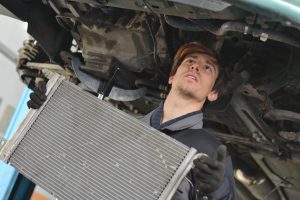
Your Chevy’s radiator is often underappreciated. It’s tough, as it has to cope with the continual flow of liquid that can be hotter than 300 F. Your radiator also operates under high pressure. This combination of heat and high pressure means that parts can eventually fail, and your Chevy dealer will need to perform a radiator repair. These are a few signs that your radiator could be in trouble.
Leaking Coolant
A coolant leak will lead to a rapid increase in your engine temperature. The coolant’s job is to absorb engine heat and transport it to the radiator for removal. Coolant flows continuously through your engine from the time the engine temperature reaches a pre-set level. Once your engine temperature drops below this level, the coolant flow shuts off.
The cooling system depends on this continual flow of coolant. A leak in the system will cause a coolant loss and drop the pressure in the system. These events slow the movement of remaining coolant, and your engine will start to overheat. Coolant leaks are usually easy to spot since the fluid is bright pink, green, yellow, or blue. We’ll find the source of the leak and fix it.
Broken Thermostat
The thermostat controls the release of coolant into your engine. It has a pre-set temperature, usually between 180 F and 220 F. When the thermostat detects your engine temperate is higher than this, it opens and releases coolant. This coolant is then rapidly pumped through the system to remove the heat and take it to the radiator.
Mechanical wear can cause the thermostat to fail, and it will jam. A thermostat jammed open will flood your engine with coolant. This rapidly lowers your engine temperature, reduces engine performance, and increases fuel consumption. If the thermostat jams closed, the temperature will increase, and your engine is in danger of overheating. Replacing the thermostat will fix this problem
Damaged Radiator
Until the 1970s, radiators were manufactured from copper and brass. This made them strong but very heavy. Your modern Chevy radiator is made from aluminum and plastic. This provides toughness yet allows the radiator to be light and reduce weight in the front of your car. Despite this strength, they can still suffer damage due to time, heat, and pressure.
Cracks can appear in the plastic sections of the radiator, and this can cause coolant leaks. The aluminum tubes in the front of the radiator can be damaged by road debris. Any damage to the radiator can lead it to fail. We can’t repair this damage, but we can replace the radiator for you.
If your radiator isn’t working the way it should, call us immediately at Orr Chevrolet of Fort Smith.





